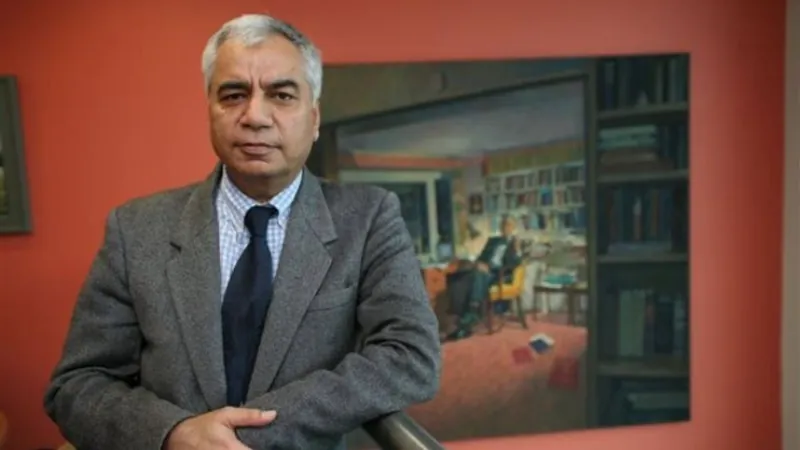
Redefining 'Normal': Dr. Dinesh Bhugra on the Evolving Landscape of Psychiatry
2024-09-18
In a provocative discussion, renowned psychiatrist Dr. Dinesh Bhugra sheds light on how our understanding of 'normal' behavior is in constant flux, driven by cultural, social, and historical factors.
Dr. Dinesh Bhugra's journey into psychiatry began during his medical studies in Pune, India, where he found himself captivated by the stark differences in human behavior despite the anatomical similarities of human bodies. His curiosity about the intersection of culture and mental health has shaped a prolific career dedicated to understanding how societal influences impact psychological well-being.
As the former president of notable organizations such as the Royal College of Psychiatrists and the World Psychiatric Association, Dr. Bhugra has fiercely advocated for marginalized populations, addressing issues like gender-based violence and elevating the mental health needs of refugees and the LGBTQ+ community. As an openly gay leader in the field, he has been particularly vocal about how prejudice contributes to mental health disparities.
Speaking with Live Science prior to the upcoming HowTheLightGetsIn festival in London, where he will discuss mental health and the elusive concept of 'normal behavior,' Dr. Bhugra highlighted a crucial point: the definitions of 'normal' vary widely across cultural contexts and can change dramatically over time.
Understanding Complexity in Psychiatry
When asked if modern psychiatry adequately incorporates the complex interplay of biological, cultural, and socioeconomic factors, Dr. Bhugra expressed concern about existing gaps in training. He noted that many clinicians, particularly in resource-limited settings like India, often rush consultations, prioritizing symptom management over a holistic understanding of a patient’s life circumstances. "Many patients are able to cope with their symptoms if they have stable employment, financial security, and supportive relationships," he explained.
Moreover, he urged a shift in focus from treating individuals merely as 'patients' with symptoms to recognizing them as unique individuals whose identities encompass a myriad of social and cultural influences. This approach calls for clinicians to view the individual as a mosaic of identities—including gender, sexual orientation, and cultural background—rather than as a monolithic 'patient' experience.
Cultural Competency and Bias Awareness
Dr. Bhugra emphasized the importance of cultural competency in psychiatric training. "Every clinician must acknowledge their cultural biases and reflect on how these can affect patient care," he stated. He believes that understanding one's cultural lens is key to appreciating the diverse experiences of patients, and that collaboration with community leaders and families can greatly inform the clinician's understanding of what is deemed 'normal' within different contexts.
As he prepares for his talk titled “What’s Normal?” at the festival, he plans to address how societal definitions of normalcy can shift. Citing the landmark shift post-Stonewall riots, where homosexuality was declassified as a mental illness, he illustrated how societal perceptions of normal can evolve, leading to profound implications for individuals previously labeled as 'deviant.'
The Role of Psychiatry in Social Advocacy
Dr. Bhugra further argued that psychiatrists have a critical responsibility to advocate for their patients, especially those unable to voice their concerns. Mental health, he says, is fundamentally intertwined with broader social determinants like education, housing, and justice, necessitating a holistic approach to health that recognizes the interconnection of these facets.
In his closing remarks, Dr. Bhugra delivered two powerful messages: first, that mental health is integral to overall health, which means we must prioritize our mental well-being just as vehemently as our physical health. Second, he cautioned against viewing health issues in isolation, emphasizing the need for policies that address the complexities of mental health alongside societal influences.
In an era where definitions of normal behavior are not just flexible but can be life-altering, Dr. Bhugra's insights underscore the importance of a culturally informed approach to mental health care—one that champions understanding, inclusive practices, and advocacy for those whose voices are often marginalized.

 Brasil (PT)
Brasil (PT)
 Canada (EN)
Canada (EN)
 Chile (ES)
Chile (ES)
 España (ES)
España (ES)
 France (FR)
France (FR)
 Hong Kong (EN)
Hong Kong (EN)
 Italia (IT)
Italia (IT)
 日本 (JA)
日本 (JA)
 Magyarország (HU)
Magyarország (HU)
 Norge (NO)
Norge (NO)
 Polska (PL)
Polska (PL)
 Schweiz (DE)
Schweiz (DE)
 Singapore (EN)
Singapore (EN)
 Sverige (SV)
Sverige (SV)
 Suomi (FI)
Suomi (FI)
 Türkiye (TR)
Türkiye (TR)